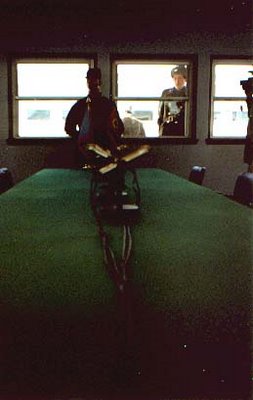Senator Webb and the green felt table

Above is a picture of a table located in a powder blue building named T-2. The T stands for temporary. There the microphones point north and south. The microphone cords designate what is termed the "MDL" (Military Line of Demarcation). It is considered the international border between South and North Korea. Senator James Webb gave the response to President Bush's State of the Union speech. During that speech he used a reference to President Eisenhower. He stated "As I look at Iraq, I recall the words of former general and soon-to-be President Dwight Eisenhower during the dark days of the Korean War, which had fallen into a bloody stalemate. "When comes the end?" asked the general who had commanded our forces in Europe during World War II. And as soon as he became president, he brought the Korean War to an end." Really. I seem to recall that all that occurred in 1953 was a temporary suspension of major hostilities. That there have been any number of violent incidents in the intervening fifty-four years. There were long talks at that truce table where the representatives of the Democratic Peoples Republic of Korea (DPRK, aka North Korea) routinely just got up and walked away from negotiations, turned off their microphones. What brought about the end of active major hostilities was the prospect of the United Nations forces overrunning the DPRK with a major offensive. (BTW, it was a resumption of massive bombing of North Vietnam that brought the communists back to the Paris Peace talks). But, there has never been a formal peace treaty between the Republic of Korea (ROK) and the DPRK. There have been American troops in Korea since 1950. So, I'm hard pressed to understand what Senator Webb means by President Eisenhower bringing about an end to the police action in Korea. But, as he was comparing the Korean War and Iraq, I thought about some logical extensions to Senator Webb's comparison that might be in order.
Let's assume that negotiations between The West and radical Islam were to occur at the truce table in T-2. The enemies of radical Islam occupied the chairs on the left side of the table, represented by, say, the United States, Israel and Britain. Then who would be seated across from them on the right? Where would the invitation to radical Islam to attend negotiations be sent?
What would, or even more succinctly, what could be negotiated? As I once heard it said that Hamas and Hezbolah want all the Jews in Israel dead. All the Jews in Israel don't want to die. What's the middle ground then? What is there for the two sides to negotiate? Same here with radical Islam and the West. The jihadists want us either converted or dead. We don't want to convert or die. Where then would the middle ground be between death and living, between loyalty to Christ and loyalty to Mohamed? Also, remember, the Qur'an allows Muslims to lie to advance Islam. What assurances (again, considering the previous sentence) could the West be given to whatever were agreed to; that the West wouldn't have to face terror at anytime, or face a myriad of splinter Islamic radical groups, as is seemingly the want of Islamic groups to splinter?
Just a couple of thoughts.
0 Comments:
Post a Comment
<< Home